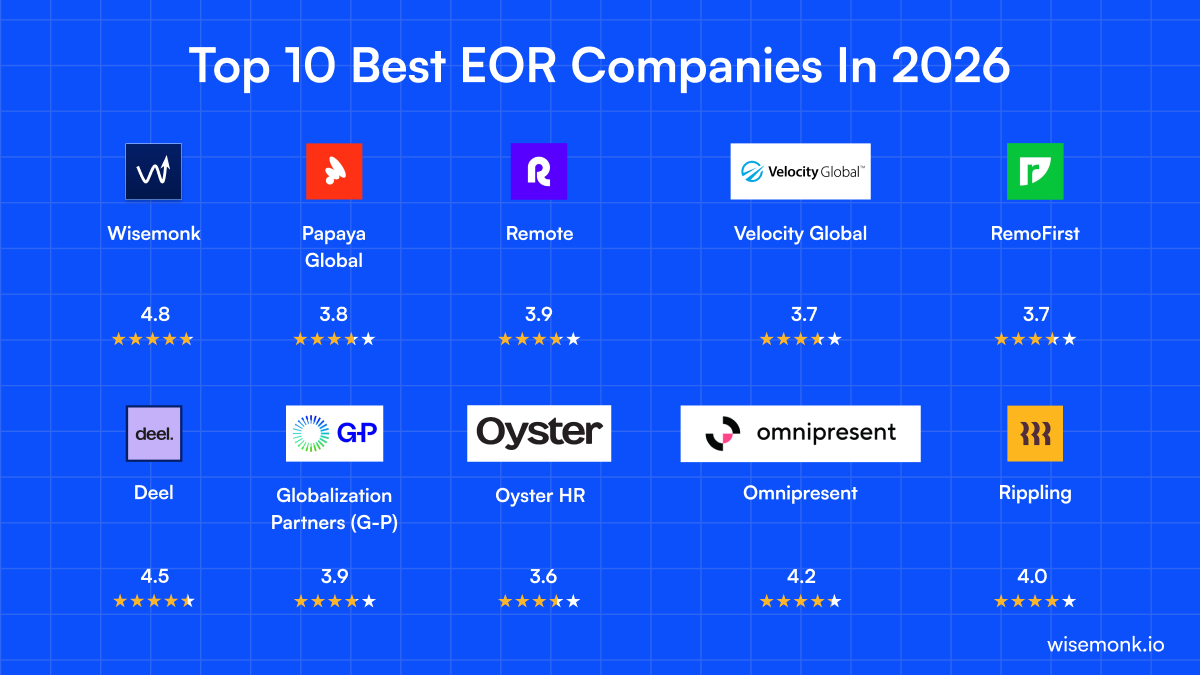Looking to tap into Turkey’s dynamic market without the hassle of setting up a local entity? An Employer of Record Turkey solution makes it possible to hire employees compliantly, manage payroll, and navigate Turkish employment law with confidence. With its unique strategic position bridging Europe and Asia, Turkey offers global companies a lot of opportunities, if you know how to play by the rules. In our experience, we’ve seen many organizations thrive here by choosing the right EOR partnership and understanding the critical legal landscape. Let’s break down how you can leverage an employer of record to scale in Turkey, while minimizing risks and maximizing growth.
What is the Turkish Employment Law Framework?[toc=Employment Law Framework]
Stepping into Turkey’s talent market means understanding a truly unique set of employment laws. We’ve found that clear compliance with regulations, right from the start, saves international employers time and costly legal risks.
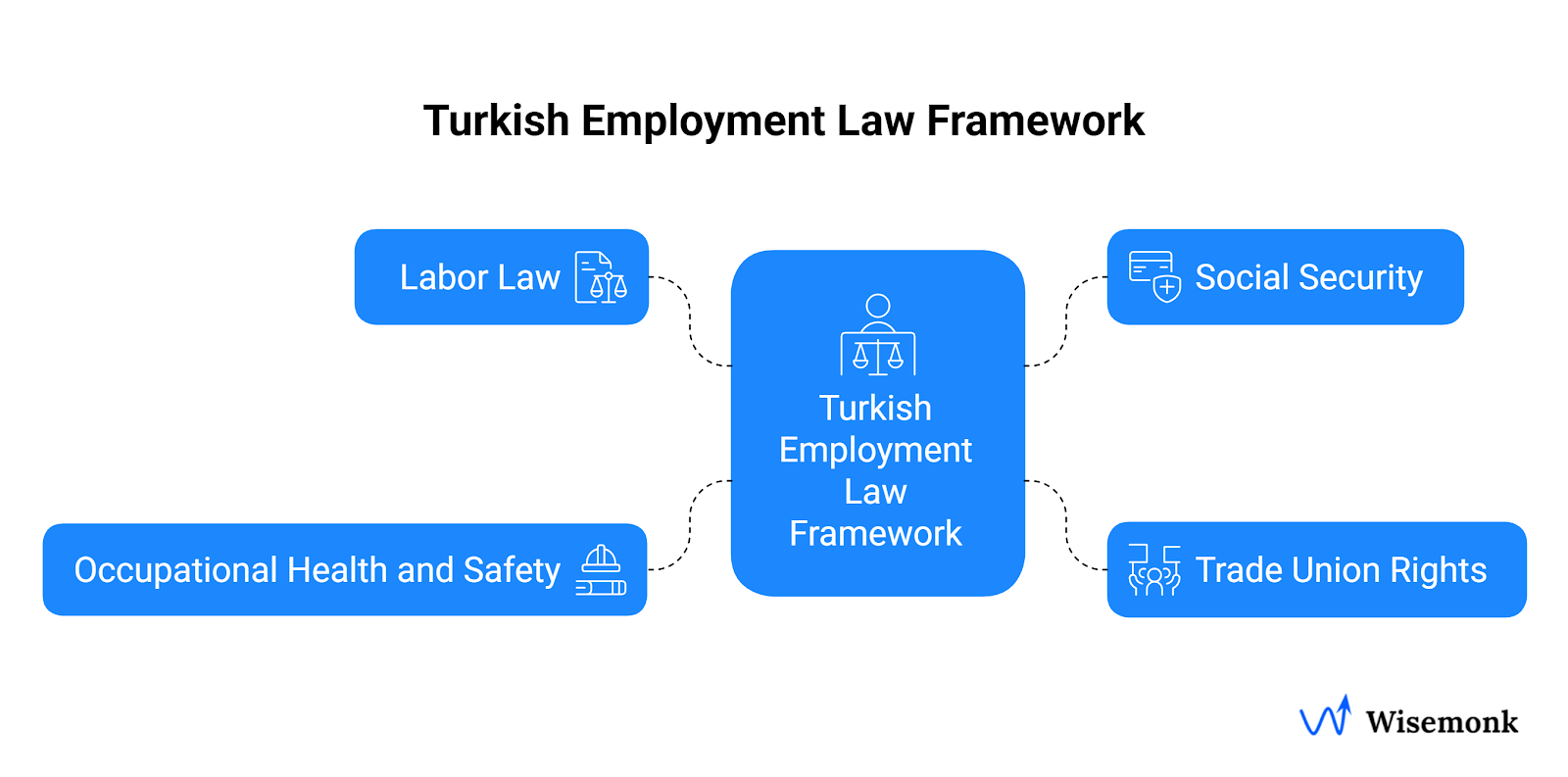
- Labor Law (İş Kanunu) No. 4857: Covers working conditions, termination, overtime, discrimination, and sets employment standards. Legal notice periods for termination range from 2–8 weeks. For 2025, severance pay is capped at TL46,655.43 per year of service.
- Social Security and General Health Insurance Law: Employers and employees share contributions funding health, retirement, and disability benefits. Every employee must be registered with the Social Security Institution (SGK), which regularly audits employers for compliance.
- Trade Union and Collective Bargaining Rights: Employees have full rights to join unions and engage in collective bargaining, protected by the Constitution and Trade Unions Act No. 6356. Anti-union discrimination is strictly forbidden, though some sectors have limits.
- Occupational Health and Safety (OHS): From January 2025, all employers, regardless of company size, must appoint certified OHS specialists and workplace physicians. Required actions include risk assessments, safety training, and regular health monitoring. Non-compliance brings heavy fines.
Mastering these rules is essential for staying compliant and building a resilient team in Turkey.
What Are the Key Benefits of Using an Employer of Record in Turkey?[toc=Key Benefits of Using an EOR]
Here’s exactly how an employer of record (EOR) can simplify and supercharge your hiring in Turkey, based on our experience and deep research:
- Instant Hiring Without a Local Entity: You can hire the best employees in Turkey almost instantly, without setting up a legal entity. EORs have all the infrastructure and local expertise needed.
- Guaranteed Compliance: The EOR will always keep your business aligned with Turkish labor law, tax obligations, and payroll processing requirements, handling all employment contracts and official paperwork.
- Streamlined Payroll and Benefits: Payroll, social security contributions, and employee benefits are managed by the EOR, easing your administrative burden and saving valuable time.
- Risk Reduction: With a deep understanding of local regulations, the EOR dramatically reduces your risk of legal issues, employee misclassification, or expensive compliance mistakes.
- Significant Cost Savings: EOR services help you achieve significant cost savings by removing the need for entity setup, frequent legal consultations, and unpredictable administrative costs. A clear, transparent pricing model is the norm.
- You Stay in Control: You maintain direct oversight of your employees’ daily work and performance, while the EOR handles everything related to HR compliance and acts as the legal employer for official purposes.
How Does Payroll and Tax Compliance Work with an Employer of Record in Turkey?[toc=Payroll & Tax Compliance]
When it comes to payroll and tax obligations in Turkey, getting things right is critical, but working with an EOR makes the process refreshingly straightforward. Based on our research and direct experience supporting international businesses, here’s what truly matters:
- Mandatory Registration with SGK: Every employer must register employees with the Social Security Institution (SGK) before they start work. This ensures all staff are covered for health insurance, unemployment, retirement, and other social benefits, which is non-negotiable according to Turkish law.
- Precise Payroll Calculations: Payroll processing in Turkey demands accurate calculation of gross salary, income tax withholdings (typically ranging from 15% to 40% in 2025), and social security contributions. The employee's share is usually 14% for social security and 1% for unemployment, while the employer's share is 20.5% and 2%, respectively.
- Strict Filing Deadlines: Employers must submit monthly tax and social security filings, most declarations (including VAT, income tax withholdings, and SGK reports) are due by the 26th of the following month; payments follow closely afterwards. Missing these deadlines results in penalties.
- EORs Take Over Compliance: A Turkey EOR manages all payroll processing, income tax filings, social security declarations, and payments directly with local authorities, so your company remains fully compliant without having to monitor evolving regulations.
- Legally Required Employee Benefits: Under Turkish law, payroll must include mandatory benefits such as paid annual leave (starting at 14 days per year and increasing with seniority), full social security coverage, paid sick leave, maternity/paternity entitlements, and in many cases, supplementary private health insurance.
- Tax Optimization Within the Law: An Employer of Record can implement cost-saving payroll and tax strategies but is legally obliged to work within the strict bounds of Turkish labor and tax regulations, ensuring no undue risk of non-compliance.
Choosing an EOR in Turkey frees up your business to focus on growth while ensuring flawless, penalty-free payroll and tax compliance from day one.
What Employee Benefits and Entitlements Are Required in Turkey?[toc=Employee Benefits & Entitlements]
Navigating employee benefits in Turkey can feel like a maze, but meeting these standards is key for attracting and retaining top talent.
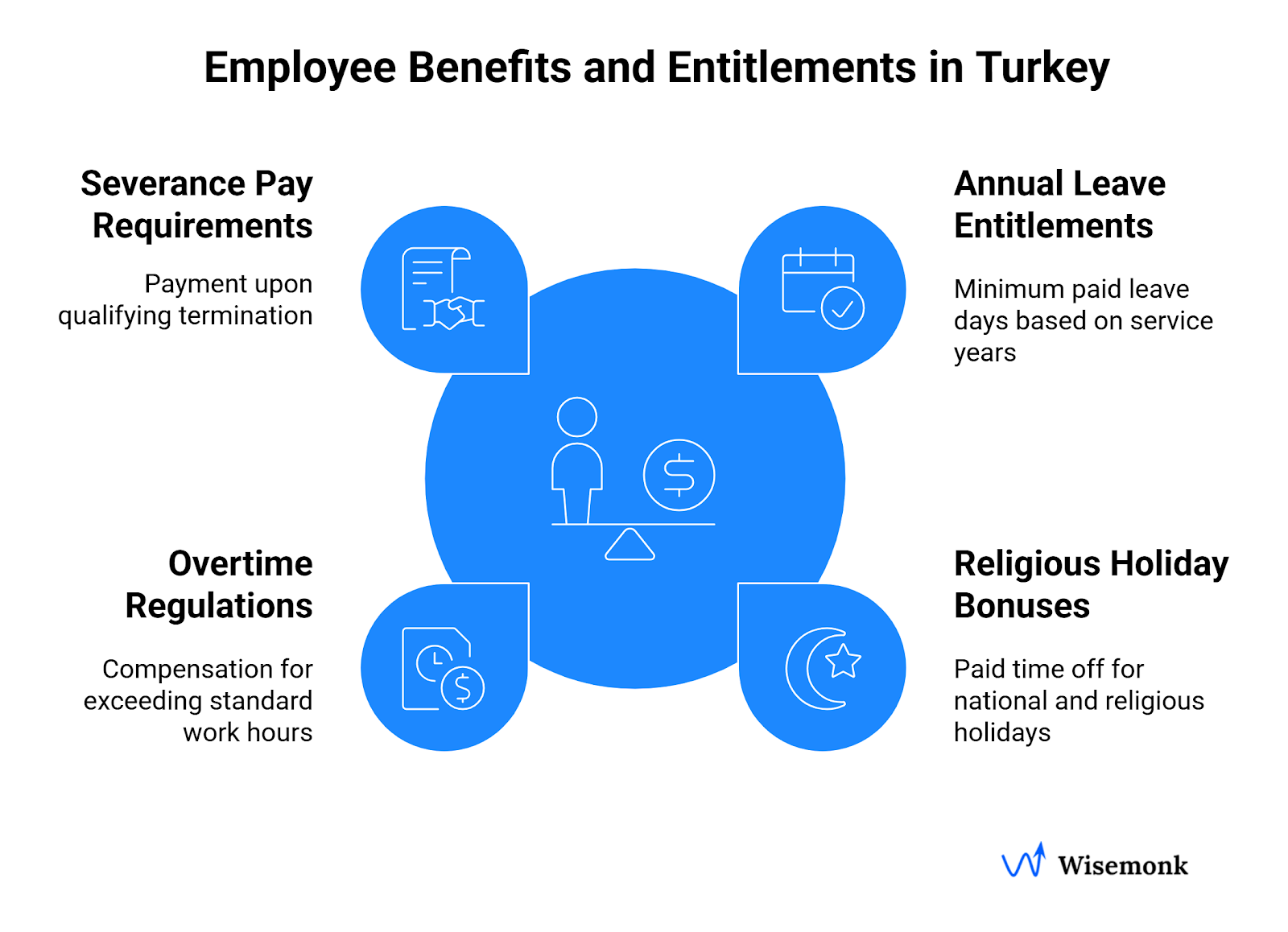
- Annual Leave Entitlements: Employees are entitled to paid annual leave after completing one year of service. The minimum is 14 days for 1-5 years of service, 20 days for 5-15 years, and 26 days for over 15 years. Employees under 18 or over 50 always receive at least 20 days.
- Religious Holiday Bonuses & Paid Holidays: While bonuses for religious holidays are not a statutory requirement, employees are entitled to paid time off for national and religious public holidays, including Eid al-Fitr and Eid al-Adha. If employees work these days, they must receive double pay, one day’s wage for the holiday and an additional day’s wage for the work performed.
- Overtime Regulations: Standard workweek is capped at 45 hours. Overtime must be compensated at a minimum of 1.5 times the regular hourly wage. Overtime cannot exceed 270 hours per year, and consent (usually written) is required from employees.
- Severance Pay Requirements: Employees with at least one continuous year of service are entitled to severance pay upon qualifying termination. The standard calculation is one month’s gross salary per year of service, subject to a legal upper limit.
These core entitlements, paid leave, public holidays, overtime pay, and severance protections, are non-negotiable under Turkish law and demonstrate a company’s commitment to a compliant, employee-friendly workplace.
What Is the Process for Hiring and Onboarding Employees in Turkey?[toc=Hiring & Onboarding Process]
Starting to hire in Turkey? In our experience helping global employers, a smooth hiring and onboarding process is the secret to fast, compliant team building. Here’s how it works in 2025, clear, concise, and by the book:
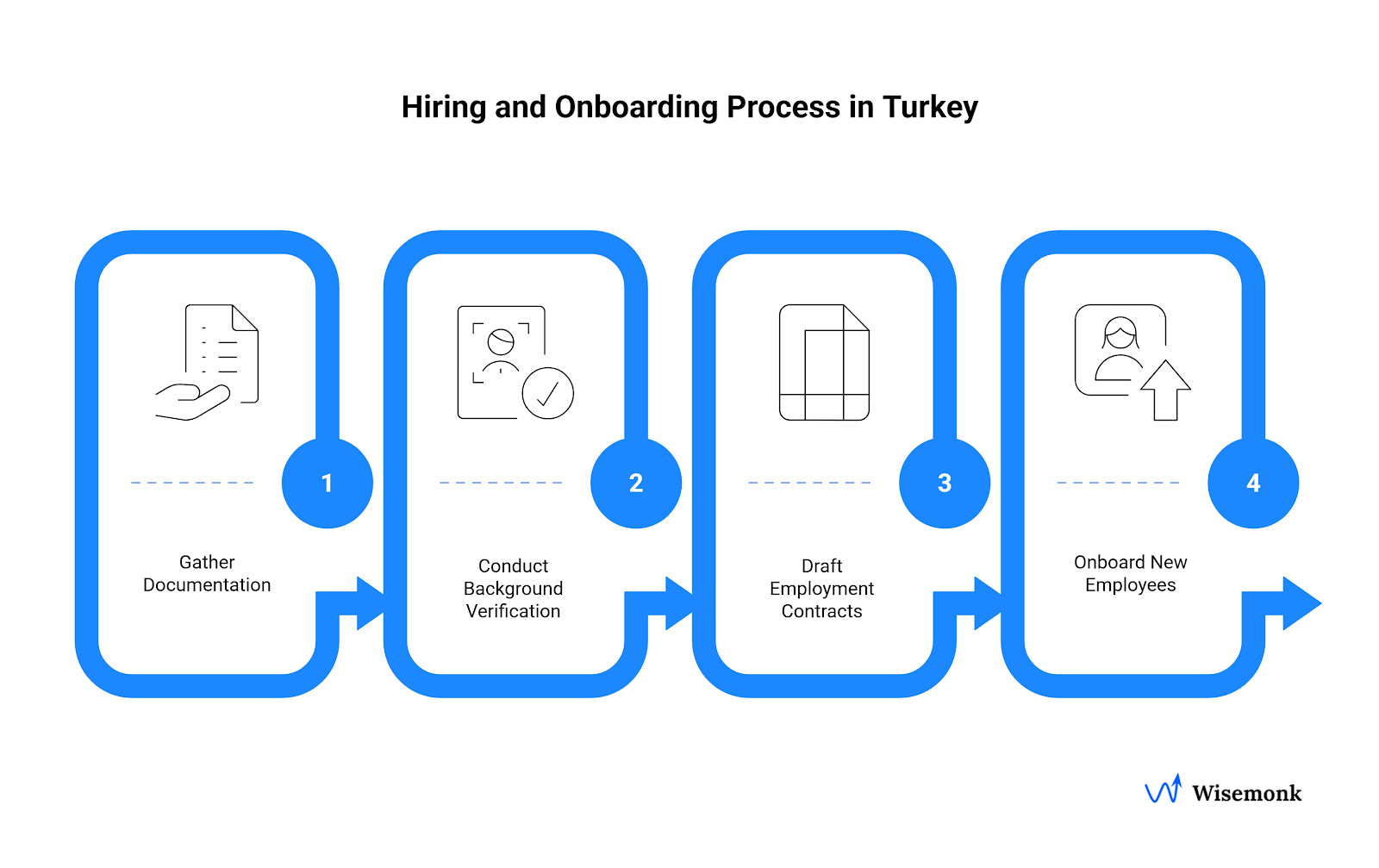
- Documentation Requirements: Before onboarding, gather the candidate’s identity card or passport, proof of address, tax ID, and social security registration. For foreign employees, a valid work permit is mandatory.
- Background Verification: While not legally required, background checks are common, especially in finance, healthcare, education, and regulated sectors. Checks focus on criminal records, employment history, and education, and must always comply with Turkey’s Personal Data Protection Law (KVKK). Explicit consent from the candidate is required before any checks are performed.
- Employment Contracts: For contracts lasting one year or more, or any fixed-term or remote work contract, a written agreement is compulsory and must be in Turkish (or bilingual for foreign employees, with the Turkish version prevailing). Critical terms include employee role, wage, working hours, leave, notice, and severance. If no written contract is signed, employers must provide a written summary of key conditions within two months of hiring.
- Onboarding Timeline and Integration: Employees are typically onboarded within 1–2 weeks after signing, including SGK registration, setting up payroll, and introducing company policies and culture. A well-defined onboarding process helps new hires become productive quickly and comply with all legal requirements.
How Do You Manage a Turkish Workforce Effectively?[toc=Workforce Management]
Adapting to Turkey’s work culture is vital for building a motivated, high-performing team. Having guided many international companies, we’ve seen these cultural insights make a real difference:
- Respect for Hierarchy: Turkish businesses are hierarchical. Managers are expected to give clear direction, and employees show strong respect for authority and seniority.
- Relationship Building: Trust and personal connections are central. Investing in rapport boosts loyalty and smooths collaboration.
- Indirect Communication: Turkish professionals often communicate indirectly to maintain harmony, reading non-verbal cues and subtleties is key.
- Collective Decision-Making: While managers decide, consulting the team fosters buy-in and aligns with the group-oriented culture.
- Performance & Feedback: Performance reviews mix formal appraisals and ongoing feedback; constructive criticism is provided carefully to avoid loss of face.
What Are the Termination Procedures in Turkey?[toc=Termination Procedures]
Ending an employment relationship in Turkey can be tricky, so here’s what you must know, straight from legal best practices and real-world experience:
- Categories of Termination: You can end a contract for ordinary reasons (like performance or business needs) with notice, or for just cause (serious misconduct) without notice.
- Notice Requirements: The statutory notice period depends on the employee’s service:
- Less than 6 months: 2 weeks
- 6–18 months: 4 weeks
- 18–36 months: 6 weeks
- Over 36 months: 8 weeks.
- Instead of working these weeks, you can pay the employee their equivalent salary (“pay in lieu of notice”).
- Severance Pay: If the employee has at least one year’s tenure, they’re entitled to severance, 30 days’ gross wages per year of service, up to the official cap (46,655.43TL for the first half of 2025, and 53,919.68TL for the second half).
- Written Documentation: You must provide written notice with clear reasons for termination (unless for just cause), and document every step for legal safety.
- Legal Risks: Failing to follow procedure can mean reinstatement orders, compensation claims (up to 8 months’ salary), or administrative fines. Always settle outstanding rights like unused leave and wages.
How Much Does It Cost to Use an Employer of Record in Turkey?[toc=Cost Analysis]
Let’s talk numbers, because budgeting right is key for any expansion. From our research and real client cases, here’s what you can expect when planning your financials for EOR services in Turkey:
- Common EOR Pricing Models:
EORs usually charge either a fixed monthly fee per employee (often €299–$1,500), a percentage of the employee’s salary (typically 2–4%), or a hybrid model. - Payroll Components:
Employer costs include gross salary, social security contributions (minimum employer share is 22.75% of the employee’s wage for 2025), unemployment insurance, and income tax deductions. For example, hiring at the minimum gross wage (TRY26,005.50/month), the total employer cost stands around TRY31,920.75/month, including all statutory deductions. - Benefits & Budgeting:
Costs can rise with add-ons such as private medical insurance, annual leave, and special employee entitlements. EOR fees usually cover payroll processing, compliance, contract management, and local support, but always check for extras. - Transparent Pricing:
Flat-rate models make budgeting easier and protect you from surprise hikes when salaries increase, while percentage-based models mean monthly fees grow alongside employee pay. - ROI Consideration:
Compared to setting up an entity, Employer Of Record services save significant time and money, simplify compliance, and reduce legal risk, especially when scaling up or down.
What Are the Most Common Challenges and Solutions for Employers of Record in Turkey?[toc=Challenges]
Even with an experienced employer of record, there are a few real obstacles to watch for. Here’s what stands out from both research and practice, plus how to handle each one:
- Bureaucratic Complexities: Navigating Turkish employment and administrative processes can be slow and detail-heavy. An Employer of Record with deep local expertise helps cut through red tape and keeps all records in perfect order.
- Frequent Regulatory Changes: Turkey regularly updates labor laws, wages, benefits, and reporting requirements change every year. Only EORs who stay fully updated avoid compliance headaches and fines.
- Cultural Integration: Language barriers and business customs can complicate onboarding and team collaboration. Reliable EOR partners offer language assistance, local HR support, and training to help teams blend smoothly.
- Work Permit Hurdles for Foreign Employees: Obtaining and maintaining valid permits for non-Turkish staff is bureaucratic and involved. A seasoned EOR manages applications and document tracking, minimizing rejections or delays.
- Payroll Disruption Due to Currency Fluctuations: Sudden changes in the Turkish Lira affect payroll forecasting and labor costs. The best EORs offer transparent reporting and help mitigate risks with proactive payroll adjustments.
- Hidden Costs or Service Gaps: Not all EORs are equally efficient or transparent; unanticipated fees or incomplete HR support are risks. Always vet EOR providers’ references, service level, and contract details to avoid surprises.
Conclusion[toc=Conclusion]
So, what’s the secret to successfully expanding your business in Turkey? Based on what we’ve seen with countless global companies, it’s all about finding an employer of record (EOR) you can trust.
- Go local for expertise: Partnering with an Employer Of Record that knows Turkish labor laws keeps you compliant and prevents surprises.
- Balance control and compliance: You lead your team while the Employer Of Record handles payroll, contracts, and legal details, making teamwork seamless.
- Streamline and save: Skip setting up a local entity and hire in Turkey faster with fewer costs and less paperwork.
- Support your people: Align contracts, benefits, and culture to keep employees happy and engaged.
- Stay ready for local hurdles: A good EOR guides you through bureaucracy, permits, and currency changes, so your growth stays on track.
Stick with these strategies, and you’ll be set up to grow your team in Turkey, simply, compliantly, and with confidence.
Ready to expand your global workforce quickly and compliantly? Partner with Wisemonk’s Employer of Record services to effortlessly manage hiring, payroll, and compliance, so you can focus on growing your business with confidence.
Frequently asked questions
What are the work permit requirements for Turkey?
Foreign nationals need a valid job offer and a work visa granted by a Turkish consulate. The employer must apply for a work permit online through the Ministry of Labor within 10 days of visa issuance.
How does the Turkish social security system work?
All employees must register with the Social Security Institution (SGK), sharing social security contributions with the employer based on monthly gross wages.
What are the severance pay calculations?
Severance pay equals one month’s gross salary per year of service, capped at legal limits, and is exempt from income tax.
How long does it take to hire through EOR in Turkey?
Hiring via an experienced EOR usually takes 1 to 2 weeks with all documents in order.
What are the cultural considerations for managing Turkish employees?
Respect hierarchy, build trust through relationships, and use indirect communication to maintain harmony.
What is the Employer of Record for international employees?
An Employer of Record (EOR) is a third-party organization that legally employs workers on your behalf globally. Your company manages day-to-day tasks, while the EOR handles payroll, taxes, benefits, and compliance.
What is the best Employer of Record?
Top EOR services include:
- Deel – Best for global hiring, payroll, and compliance.
- Borderless AI – Best AI-driven EOR platform.
- RemoFirst – Best for budget-conscious remote teams.
- Velocity Global – Best for global expansion support.
- Remote – Best for fast and compliant global hires.
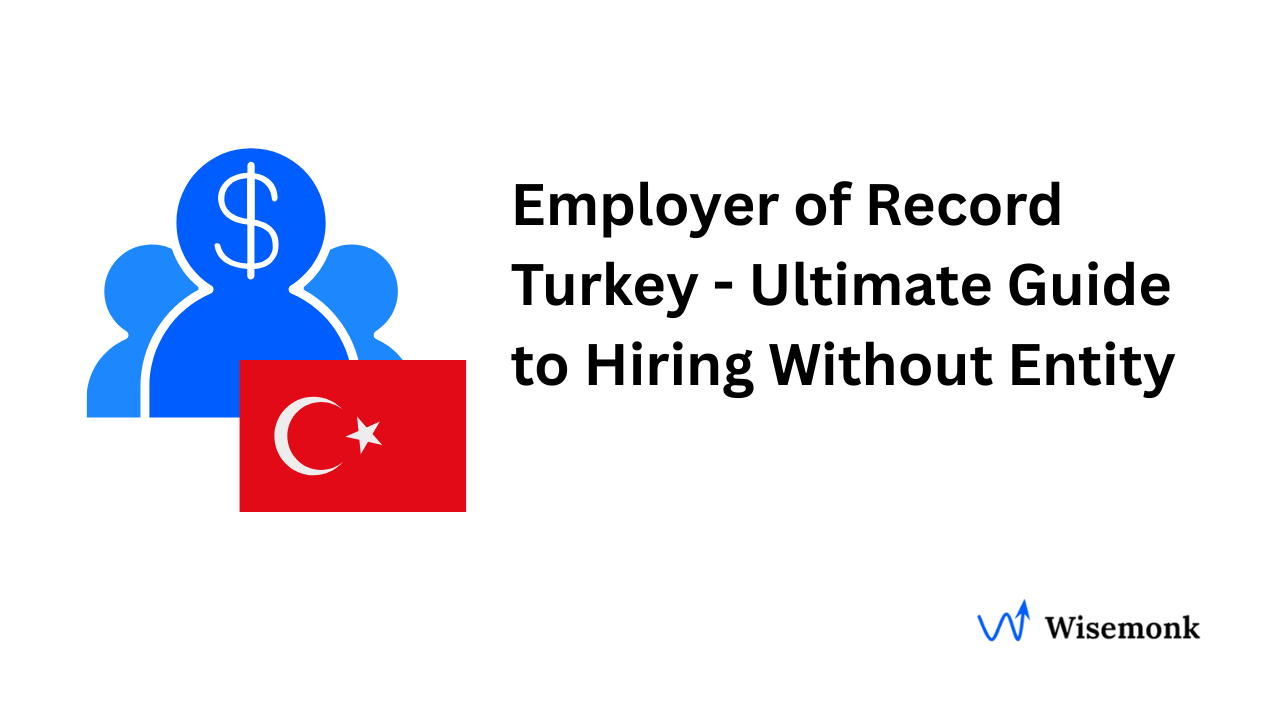
.png)
%20(1).webp)
